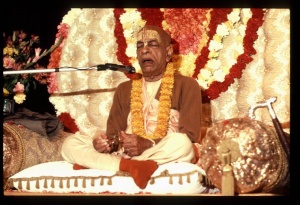SB 10.29.24: Difference between revisions
m (1 revision(s)) |
(Vanibot #0054 edit - transform synonyms into clickable links, which search similar occurrences) |
||
| (One intermediate revision by one other user not shown) | |||
| Line 1: | Line 1: | ||
{{info | {{info | ||
|speaker=Lord | |speaker=Lord Kṛṣṇa the Supreme Personality of Godhead | ||
|listener= | |listener=gopīs | ||
}} | }} | ||
[[Category:Srimad-Bhagavatam - Canto 10 Chapter 29]] | |||
[[Category:Bhagavatam Verses Spoken by Lord Krsna - Vanisource|102924]] | |||
<div style="float:left">'''[[Srimad-Bhagavatam]] - [[SB 10|Tenth Canto]] - [[SB 10.29: Krsna and the Gopis Meet for the Rasa Dance|Chapter 29: Kṛṣṇa and the Gopīs Meet for the Rāsa Dance]]'''</div> | |||
<div style="float:right">[[File:Go-previous.png|link=SB 10.29.23]] '''[[SB 10.29.23]] - [[SB 10.29.25]]''' [[File:Go-next.png|link=SB 10.29.25]]</div> | |||
{{RandomImage}} | |||
{{SBnotice}} | |||
==== TEXT 24 ==== | ==== TEXT 24 ==== | ||
<div | <div class="verse"> | ||
bhartuḥ śuśrūṣaṇaṁ strīṇāṁ | :bhartuḥ śuśrūṣaṇaṁ strīṇāṁ | ||
paro dharmo hy amāyayā | :paro dharmo hy amāyayā | ||
tad-bandhūnāṁ ca kalyāṇaḥ | :tad-bandhūnāṁ ca kalyāṇaḥ | ||
prajānāṁ cānupoṣaṇam | :prajānāṁ cānupoṣaṇam | ||
</div> | </div> | ||
| Line 17: | Line 22: | ||
==== SYNONYMS ==== | ==== SYNONYMS ==== | ||
<div | <div class="synonyms"> | ||
''[//vanipedia.org/wiki/Special:VaniSearch?s=bhartuḥ&tab=syno_o&ds=1 bhartuḥ]'' — of one's husband; ''[//vanipedia.org/wiki/Special:VaniSearch?s=śuśrūṣaṇam&tab=syno_o&ds=1 śuśrūṣaṇam]'' — faithful service; ''[//vanipedia.org/wiki/Special:VaniSearch?s=strīṇām&tab=syno_o&ds=1 strīṇām]'' — for women; ''[//vanipedia.org/wiki/Special:VaniSearch?s=paraḥ&tab=syno_o&ds=1 paraḥ]'' — the highest; ''[//vanipedia.org/wiki/Special:VaniSearch?s=dharmaḥ&tab=syno_o&ds=1 dharmaḥ]'' — religious duty; ''[//vanipedia.org/wiki/Special:VaniSearch?s=hi&tab=syno_o&ds=1 hi]'' — indeed; ''[//vanipedia.org/wiki/Special:VaniSearch?s=amāyayā&tab=syno_o&ds=1 amāyayā]'' — without duplicity; ''[//vanipedia.org/wiki/Special:VaniSearch?s=tat&tab=syno_o&ds=1 tat]-[//vanipedia.org/wiki/Special:VaniSearch?s=bandhūnām&tab=syno_o&ds=1 bandhūnām]'' — to the relatives of their husbands; ''[//vanipedia.org/wiki/Special:VaniSearch?s=ca&tab=syno_o&ds=1 ca]'' — and; ''[//vanipedia.org/wiki/Special:VaniSearch?s=kalyāṇaḥ&tab=syno_o&ds=1 kalyāṇaḥ]'' — doing good; ''[//vanipedia.org/wiki/Special:VaniSearch?s=prajānām&tab=syno_o&ds=1 prajānām]'' — of their offspring; ''[//vanipedia.org/wiki/Special:VaniSearch?s=ca&tab=syno_o&ds=1 ca]'' — and; ''[//vanipedia.org/wiki/Special:VaniSearch?s=anupoṣaṇam&tab=syno_o&ds=1 anupoṣaṇam]'' — the care. | |||
</div> | </div> | ||
{{SBcollapse}} | |||
==== TRANSLATION ==== | ==== TRANSLATION ==== | ||
<div | <div class="translation"> | ||
The highest religious duty for a woman is to sincerely serve her husband, behave well toward her husband's family and take good care of her children. | The highest religious duty for a woman is to sincerely serve her husband, behave well toward her husband's family and take good care of her children. | ||
</div> | </div> | ||
| Line 31: | Line 36: | ||
==== PURPORT ==== | ==== PURPORT ==== | ||
<div | <div class="purport"> | ||
Śrīla Jīva Gosvāmī astutely points out here that the gopīs real, eternal husband is Lord Kṛṣṇa, not their so-called husbands at home, who falsely considered the gopīs their property. Thus a strict interpretation of the word amāyayā, "without illusion," reveals that the supreme religious duty for the gopīs is to serve Śrī Kṛṣṇa, their real lover. | Śrīla Jīva Gosvāmī astutely points out here that the ''gopīs'' real, eternal husband is Lord Kṛṣṇa, not their so-called husbands at home, who falsely considered the ''gopīs'' their property. Thus a strict interpretation of the word ''amāyayā'', "without illusion," reveals that the supreme religious duty for the ''gopīs'' is to serve Śrī Kṛṣṇa, their real lover. | ||
</div> | </div> | ||
__NOTOC__ | </div> | ||
</div> | |||
<div style="float:right">[[File:Go-previous.png|link=SB 10.29.23]] '''[[SB 10.29.23]] - [[SB 10.29.25]]''' [[File:Go-next.png|link=SB 10.29.25]]</div> | |||
__NOTOC__ | |||
__NOEDITSECTION__ | |||
Latest revision as of 18:44, 17 February 2024

A.C. Bhaktivedanta Swami Prabhupada
Please note: The synonyms, translation and purport of this verse were composed by disciples of Śrīla Prabhupāda
TEXT 24
- bhartuḥ śuśrūṣaṇaṁ strīṇāṁ
- paro dharmo hy amāyayā
- tad-bandhūnāṁ ca kalyāṇaḥ
- prajānāṁ cānupoṣaṇam
SYNONYMS
bhartuḥ — of one's husband; śuśrūṣaṇam — faithful service; strīṇām — for women; paraḥ — the highest; dharmaḥ — religious duty; hi — indeed; amāyayā — without duplicity; tat-bandhūnām — to the relatives of their husbands; ca — and; kalyāṇaḥ — doing good; prajānām — of their offspring; ca — and; anupoṣaṇam — the care.
Translation and purport composed by disciples of Śrīla Prabhupāda
TRANSLATION
The highest religious duty for a woman is to sincerely serve her husband, behave well toward her husband's family and take good care of her children.
PURPORT
Śrīla Jīva Gosvāmī astutely points out here that the gopīs real, eternal husband is Lord Kṛṣṇa, not their so-called husbands at home, who falsely considered the gopīs their property. Thus a strict interpretation of the word amāyayā, "without illusion," reveals that the supreme religious duty for the gopīs is to serve Śrī Kṛṣṇa, their real lover.